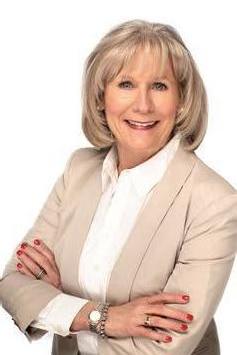
18 minute read
Why RPAC Matters Nigel Swaby
Egor©/ Adobe Stock
Why RPAC Matters
By Nigel Swaby
Some people don’t realize it, but real estate is one of the most regulated industries in this country. In fact, it’s regulated at every level of government from Washington, D.C., to the smallest towns in the nation. Not only is our industry regulated, but our product is too! From building materials to energy to zoning to signage, every aspect of our business in real estate has governmental rules to follow. Almost every real estate adjacent business faces the same sort of regulatory scrutiny. Appraisers, lenders, builders, title, home inspectors and insurance are all subject to an array of rules and regulations to help protect our clients. It’s no surprise then that our boards and associations across the country invest heavily in government relations at every level. The vehicle our industry uses is RPAC (Realtors® Political Action Committee). RPAC donations are distributed for use at the national, state and local board level. RPAC funds are used to donate to candidates who support our issues which helps establish relationships with elected officials. They’re also used to fund research grants on topics like impact fees and affordable housing. As the chair of the Elections Subcommittee at the Salt Lake Board of Realtors®, I see firsthand how RPAC funds benefit our industry. While not every candidate we support will win, the interview process we go through allows us to meet just about every elected official and share our thoughts on housing issues as well as understand what their thoughts are.
Developing those relationships allows us to have some influence when big issues are decided. Last year as Covid-19 rapidly grew, states and localities instituted different lockdown measures ultimately creating classes of “essential” and “non-essential” business types. In Pennsylvania, real estate transactions were curtailed because of Covid. In Utah, our government affairs departments worked hard with leaders at all levels to ensure housing, one of human’s greatest needs, could continue in a safe and responsible way. While our Covid response is a recent emergency example, some of the work that gets done involves longer, strategic measures. In addressing affordable housing, one of the key tools many politicians point to is accessory dwelling units. Despite their like of this type of housing, few ADUs are constructed each year; certainly not enough to begin to address the housing shortages our state faces. In the last legislative session, our government affairs staff worked closely with Representative Ray Ward to draft HB 82 which established a statewide ADU policy to allow more of these needed housing types to be constructed. It even provided funding for those homeowners who want to build them and rent to tenants in lower income levels. As our real estate market becomes more heated, it’s even more critical for our industry to have meaningful relationships with government officials. For those of us who have been in the industry for a while, we vividly remember the aftermath of the 2007-09 housing crash. When all the dust had settled from that debacle, government added more regulation to the lending and real estate industries; policies that still affect those industries today. Over the course of the year, we remind members of the importance of RPAC and ask for investments. Our next big drive comes during annual dues renewal. Please help us continue to maintain good relations with the people who regulate our industry. Donate to RPAC with your 2021 dues renewal. Nigel Swaby is the Government Affairs Committee vice chair and elections chair.

Erich Telford

Director of Operations Pattie DeNunzio
Account Executive

Heather Woolsey

Escrow O cer Sam Jensen
Commercial Escrow O cer We’re Secured Land Title, your trusted local title and escrow company. We’re making a di erence in Utah by building communities, partnerships, and opening doors to opportunities.
Contact us to schedule your closing 7090 Union Park Ave., Suite 425 Midvale, UT 84047 801.488.5340
SECURED Land Title
Learn more at SecuredLandTitle.com

4 Emerging Real Estate Trends
By Melissa Dittmann Tracey
The COVID-19 pandemic has caused a mass disruption to the way people live and work and prompted sweeping economic fallout felt throughout the world. Global leaders are still coming to grips with the long-term impact to the real estate industry. COVID-19 has accelerated many existing trends, including digitalization, dispersed working, and online shopping, panelists said at a webinar on Wednesday highlighting the Urban Land Institute’s newly released “Emerging Trends in Real Estate Global Outlook 2021” report. “The industry leaders canvassed for Global Emerging Trends are hopeful of a consumerspending-led economic recovery feeding through an uptick in real estate business in the second half of 2021,” the report notes. “But much will depend on the rollout of the vaccine and an easing of lockdown restrictions.” The Asia Pacific region appears to be leading the

Song_about_summer©/ Adobe Stock
recovery globally compared with many Western economies, researchers note. That has prompted more global investors to increase their allocations of capital to the region. But the U.S. is also posting growth to many of its real estate sectors and seeing some evolve to better compete in the post-pandemic world. Here are a few of the trends highlighted in ULI’s report that are on the radar for global real estate markets:
Real estate continues to attract capital.
Low interest rates are fueling interest in real estate across the globe. “Most industry leaders interviewed for this report believe the inherent attraction of real estate income is even stronger this year than in pre-COVID times,” according to the ULI report. Favorable supply-demand dynamics have led investors to increase their allocation to residential markets, a trend that has only been accelerated by the COVID-19 outbreak, the report notes.
Unknowns loom for the office sector.
The office sector, however, is more difficult for real estate leaders to predict. The rise of remote working, the increasing concern for the health and wellbeing of employees, and the lessening appeal of long commutes in big cities could negatively impact leasing activity this year and next year. Many large firms could delay corporate decisions on office space, or commit to a greater reliance on remote working. Many real estate leaders do predict employees will eventually return to the office, even if in more of a “hybrid” working model. One area of growth for the office sector: flexible space. (Read more: CoWorking Spaces May Soon See a Surge in Activity) “Industry leaders predict a polarization between perceived high-quality buildings—modern and adaptable—and outdated and inflexible secondary stock that is likely to suffer from a marked decline in demand,” the report notes.
ESG tops more agendas. The impact of carbon emissions from the built environment remains a pressing issue for more companies, and they’re placing a greater emphasis on environmental, social, and governance agendas. “Though decarbonization and climate change have been rising up the agenda for years, it is only in the past 18 months that these issues have moved to the foreground of the industry’s thinking,” the ULI report notes. “So far, the pressure is coming from the providers of finance and the biggest tenants. There is, though, the expectation that governments will ramp up regulation in the coming years.” More companies are showing a greater focus on putting into place strategies with decarbonization and realizing the consequences of carbon emissions from their buildings.
Re-imagined retail. The physical brick-andmortar retail sector has faced the increasing threat of online competition—even more so since the pandemic. But investors are not shying away from seeking out new opportunities in retail, particularly as they view some falling prices in the sector. As such, retail could be acquired and repositioned either as more usable retail formats or re-envisioned as something completely different, such as residential or urban logistics.
Reprinted from Realtor® Magazine Online, April 2021, with permission of the National Association of Realtors®. Copyright 2021. All rights reserved.

elnariz©/ Adobe Stock
8 Ways to Make Yourself a More Likable Agent
Master these behaviors to endear yourself to your clients in a deeper manner.
By Melissa Dittmann Tracey
Being a nice person certainly helps when cultivating business relationships, but it takes more than a warm smile to curry the favor of prospects. Likable people possess certain traits you can adopt to make yourself more endearing to those you hope will become your next client. But don’t underestimate others’ ability to pick up on feigned sincerity and genuineness. Emotional intelligence—comprising skills such as self-awareness, self-management, social awareness, and relationship management—is not only innate but can, in fact, be taught and developed, according to research by Travis Bradberry, coauthor of Emotional Intelligence 2.0. Bradberry has developed an emotional intelligence test, which reveals specific areas users need to work on. “Becoming cognizant of your gestures, expressions, and tone of voice— and making certain they’re positive—will draw people to you like ants to a picnic,” Bradberry said. “Our research shows that people who possess these skills outperform those who don’t by a large margin.” You know that watching your body language and being aware of your facial expressions will have an impact on the quality of the connection you strive to make with new clients. Go deeper to truly become more likable with these eight tips on emotional validation (which are backed up by scientific research).
Say the prospect’s name repeatedly
throughout the conversation. “A person’s name is, to him or her, the sweetest and most important sound in any language,” according to author Dale Carnegie in his book How to Win Friends and Influence People. Make a habit of starting and ending conversations using a potential client’s name, such as: “It’s nice to see you, Jane,” or “It was nice talking with you, Jane.” When you say a person’s name, you demonstrate both interest and respect for them.
Give them the floor to speak first.
Encourage your prospects to tell you about themselves and their situation before you tell them about yourself. Research has shown that when people talk about themselves, it creates neurological changes in the brain that can make them more receptive to your message. “Once
those feel-good neurotransmitters are flowing and people start feeling connected to you, they’re much more likely to take you and your contributions seriously,” Bradberry said.
Mirror their body language. It’s often done unconsciously, but try to subtly adopt the posture, gestures, or vocal qualities of the person you’re speaking with. When two people mirror each other’s body language, it often means a bond has been formed. For example, if your prospect leans her head to the side as she’s talking, try doing the same. “It’s a sign that the conversation is going well and that the other party is receptive to your message,” Bradberry said. “This can be especially useful when you’re negotiating because it shows you what the other person is really thinking about the deal.” But don’t make it obvious you’re copying other’s body language; it can make them suspicious, researchers say.
Don’t focus on proving your competence.
You may think gaining trust is about showing people your knowledge of the market and that you “know your stuff” as a real estate professional. The truth is that smarts and talent often are secondary to emotional cues in clients’ eyes. Others can perceive you as manipulative if you stress your competence before establishing warmth and trustworthiness, according to a study by a Harvard Business School researcher. Instead, make time for chit-chat, and focus on finding something you have in common with a prospect. When two people find common ground, they begin to like each other by gut instinct, researchers noted. You’re drawn to those who share similar interests to you, and those similarities help you build a powerful bond with one another.
Offer a favor that won’t immediately
increase your bottom line. Listen carefully for the problems your prospects need solutions to—whether it’s related to real estate or not—and think of a quick favor you could do for them (that doesn’t require anything in exchange) to help them and add value to your relationship, said Adam Grant, author of Give and Take: Why Helping Others Drives Our Success. Perhaps you could recommend or get an estimate from a handyman or painter for a prospect who’s struggling with a renovation. Though it’s related to real estate, such a favor is not linked to an immediate business need of yours, so it appears more good-natured. Salespeople who use this giving approach earn 68 percent more revenue than those who take, i.e. put their own ambitions first, according to research in Grant’s book. (Find
Ask questions that require a longer,
thoughtful response. Open-ended questions or questions asking for clarification show the prospect that you’re listening and you care about their responses. If you mostly ask simple “yes” or “no” questions, on the other hand, it shows you’re only interested in need-to-know information that will lead to a sale quickly. “People like to know you’re listening,” Bradberry said. “You’ll be surprised how much respect and appreciation you gain just by asking questions.”
Show you have interests outside of real
estate. Being absorbed with one topic area can make you appear uninteresting. “Likable people balance their passion for their work with their ability to have fun,” Bradberry said. “At work, they are serious yet friendly. They still get things done because they are socially effective in short amounts of time, and they capitalize on valuable social moments. They focus on having meaningful interactions with their coworkers, remembering what people said to them yesterday or last week, which shows people that they are just as important to them as their work is.”
Validate people’s complaints. You don’t have to agree with everything another person said, but making others feel heard and understood will make you more approachable. If a prospect or coworker complains, say, “I’m sorry—I can only imagine how you feel.” Such validation is a powerful way to build a connection, Bradberry said. It gives the other person a sense of empowerment and tells them you’re a nonjudgmental person they can work with. “Having an open mind is crucial in the workplace, where approachability means access to new ideas and help,” he said. Take a critical look at your interactions. How do others really perceive you? “Most of us are putting the blinders on and not taking a look at the things we need to change because we think it isn’t going to do us any good,” Bradberry said. “The trick is to practice self-awareness to the point where you recognize your insincerity in a conversation. Then you’ll be able to adjust accordingly.”
Melissa Dittmann Tracey is a contributing editor for REALTOR® Magazine. She can be reached at mtracey@nar.realtor. Reprinted from Realtor® Magazine Online, June 2017, with permission of the National Association of Realtors®. Copyright 2017. All rights reserved.

Michael©/ Adobe Stock
Spa-Inspired Bathrooms are En Vogue
With more homeowners looking for ways to pamper themselves at home, here are nine ways bathroom makeovers are mimicking aspects of hotels and resorts.
By Barbara Ballinger
With many homeowners continuing to spend more time at home, they’re not only seeking comfort in their kitchens, offices, and outdoor spaces—they’re also updating their master bathrooms to create a spa-like retreat. Looking to hotels and resorts for inspiration, homeowners are incorporating large showers with multiple faucet sprays, heated floors and towel racks, separate toilet rooms, soothing color palettes, and more, said Mary Cook, founder of the Chicago interior architecture and design firm, Mary Cook Associates. “Dual-income, well-educated millennials are driving a desire for more bells and whistles, yet they’re choosing ones that are also practical and add value and worth,” she said. The most common choices involve sophisticated technology, lower-maintenance materials, and aesthetics found elsewhere in their home. Not surprisingly, costs add up, but many designers like Denise Benach, director of interior design for Chicago builder Lexington Homes, find that homeowners are willing to spend more on bathrooms. An average remodel now hovers between $10,000 and $25,00, according to HomeAdvisor. Real estate pros should inform buyers about what’s available so they can get the look and function they want within their budget.
1. Increasing the bathroom footprint.
When houses are built or master bedroom suites added, one goal may be to gain more space. But sometimes that’s a challenge. According to a


jStock©/ Adobe Stock
2020 Houzz survey, the online decorating source, only 20 percent of homeowners increased the bathroom’s size during a renovation. Designer Sharon McCormick, whose eponymous firm is in Hartford, Conn., said some homeowners want space for seating, which reflects the role of the bathroom as more than its functional space. Jodi Swarz, head of KitchenVisions in the Boston area, is also witnessing homeowners trade extra bathroom space for an adjacent closet or maybe a dressing room.
2. Bigger, yet simpler showers.
Although a larger, better outfitted shower increases a bathroom remodeling cost threefold, adding up to $14,000, according to the Houzz report, it’s still a feature most homeowners want. Boston-area designer Diane Burcz said her clients want a walk-in shower design. Showers with a curb and linear drain may be about 69 inches wide and 66 inches deep, while those without may be a smaller 52 inches wide and 45 inches deep. Within the shower, many want to add a built-in or portable bench and smart-home plumbing fixtures that personalize the water experience. For example, they might incorporate one or two oversized rain heads that can turn on to a specified temperature and flow, said Burcz. Broker Millie Rosenbloom, with Baird & Warner in Chicago, who’s selling condos at a new mixeduse development, Parkline Chicago, agreed. “The new designs offer triple the volume of water as the old-fashioned ones did,” she said. Besides a rain head, they may want a hand-held wand. And if the homeowners are a couple, they each may have a different wish list, McCormick said. Some showerheads offer aromatherapy with different scents in the same way you choose your favorite coffee K cup, said JT Norman, business development design and innovation at Elements, the bathroom division at Nazareth, Pa.-based Kitchen Magic. Overall, the shower look is cleaner with fewer fixtures lining walls, Burcz said. “People no longer want 14 heads to give them the effect of a car wash that blasts them from all sides and uses too much water, as some states mandate usage,” said William Strang, president of operations and ecommerce at TOTO USA.
3. Tubs with sculptural designs.
Rumors of the tub’s demise have turned out to be exaggerated. Those who have the space often want one of the newer sculptural freestanding models. Many designers find these tubs represent an artistic status symbol, says architect William Ramsey, AIA, with KTGY Architecture + Planning’s Denver office. However, Swarz is among the designers who tries to talk clients out of them since she finds they are hard to get into and out of and not comfortable for resting arms or setting toiletries. If clients want a tub, a more practical option is a drop-in model set against a wall so a ledge can be included. For those seeking something extra, choose a model with jets and lights for chromotherapy.
4. Separate vanities and storage.
The clutter-free look is in, which means there’s a desire for more storage to stash stuff like workout clothes, hairdryers, and electric toothbrushes. More designers are creating separate storage areas for couples who share bathrooms, said Rosenbloom. Chicago designer Susan Brunstrum of Studio Brunstrum said homeowners can do their part by editing what they bring into the room. “Do you really need four bottles of shampoo and five conditioners?” she asked. Some designers also like to raise cabinetry off the floor to make heating and cleaning easier. Having two vanities or sinks has become a must(continued on page 30)
SANDY DAY Stewart Title 801-918-9669 sandy.day@stewart.com
KOLEEN FADDIS I NMLS#486864 Mountain America Credit Union 801-891-5032 kfaddis@macu.com
MCCAULEY FLINT U.S. Title Agency 801-644-6970 mflint@ustitleutah.com
BOB GOODSON First American Title 801-231-5857 bgoodson@firstam.com
BJ HANSEN I NMLS#218202 South Towne Mortgage 801-550-9944 bj@southtownemortgage.com BRITTANY JENSEN Novation Title 435-669-8822 bjensen@novationtitle.com
AMANDA LANDERS I NMLS#351348 Gateway Mortgage 801-550-9258 amanda.landers@gatewayloan.com
LONI LARSEN Pillar to Post 801-244-5255 lonilarsen@comcast.net
TERRIE LUND U.S. Title Agency 801-414 4188 tlund@ustitleutah.com
SANDRA PERKINS Acclaimed Home Warranty 385-232-6167 sandra@acclaimedhw.com
DONNA RENTMEISTER American Family Insurance 801-381-1938 drentmei@amfam.com
MARITA VISELLI I NM LS #261036 lnspiro Financial 801-755-4988 mviselli@inspirofinancial.com
DAVE YOUNG I NMLS#66797 America First Credit Union 801-386-6491 dyoung@americafirst.com What we do: Abide by the Realtor® Code of Ethics I Commit to helping you find the right services for your business model and clientele I Support The Realtor® Political Action Committee (RPAC) I Work to ensure a smooth business transaction from start to finish I Help you build YOUR team.


k_4J_/_�
COMMITTEE CHAIR Veritas Funding I 801-688-0599 I NMLS#288635 khendry@vfund.com rld::cl�



